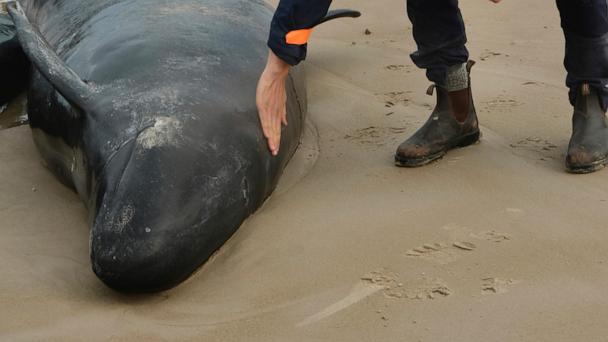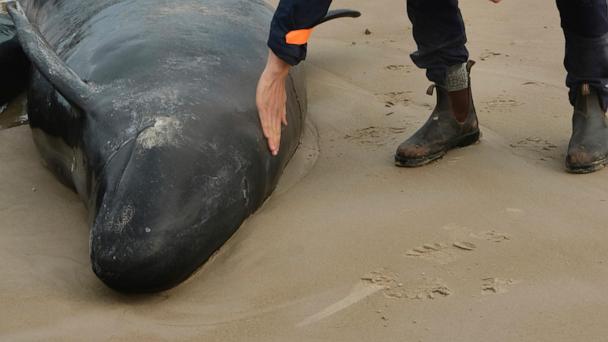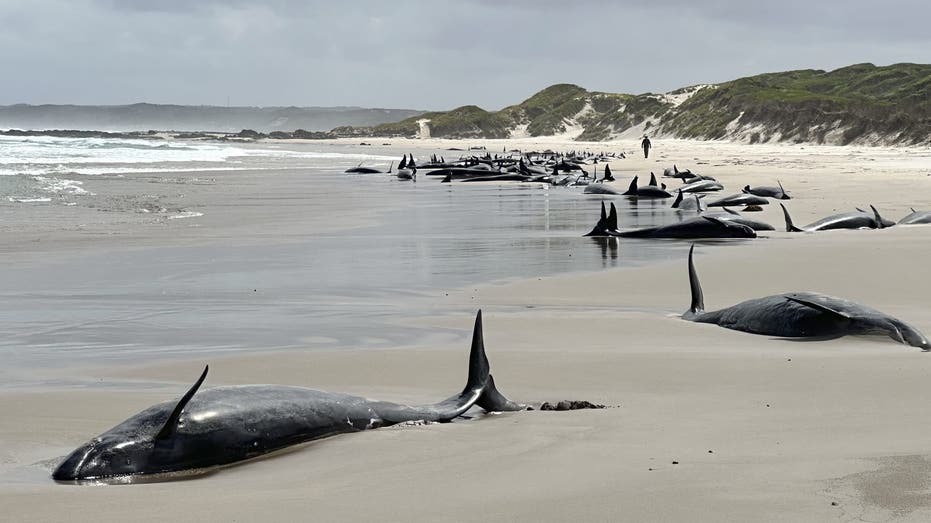
Experts Abandon Rescue Efforts for 150+ Stranded False Killer Whales in Tasmania
Marine specialists declared a tragic end to rescue efforts aimed at saving over 150 false killer whales that became stranded on a remote Tasmanian beach. The heartbreaking decision was announced on Wednesday, marking a somber moment for wildlife preservation advocates and local communities alike.
Initial Discovery and Response
The distressing incident unfolded near Arthur River on Tasmania’s northwestern coast, where 157 whales were discovered on an exposed surf beach Tuesday afternoon, according to the Department of Natural Resources and Environment (DNRE). A coordinated response involving veterinarians and marine experts was swiftly mobilized to address the crisis.
Challenging Conditions Hinder Rescue
Incident controller Shelley Graham expressed deep concern as unfavorable ocean and weather conditions led to a halt in rescue efforts on Wednesday. These conditions were projected to persist for several days, compounding the challenge of reaching the stranded whales.
“We have been out in the water this morning and relocated and attempted to refloat two whales,” Graham stated. “But we weren’t successful as the ocean conditions prevented the animals from getting past the break. They keep restranding.”
A Heart-Wrenching Decision to Euthanize
As the plight of the whales became increasingly dire, marine biologist Kris Carlyon spoke to the agony facing the remaining animals. He confirmed that, regrettably, the remaining whales would be euthanized due to their escalating suffering.
“The longer these animals remain stranded, the more they suffer. All alternative rescue methods have been unsuccessful,” Carlyon explained.
The number of survivors had initially stood at 136 on Wednesday morning but was revised to just 90 later that day. Factors contributing to this rapid decrease included the remote location’s harsh environment, rough ocean conditions, and logistical challenges in bringing in specialized rescue equipment.
The Size and Nature of the Stranded Pod
The stranded whales varied in size, with juveniles weighing as little as 1,100 pounds and adults reaching up to 3.3 tons. Despite their name, false killer whales belong to the dolphin family and rank as one of its largest species.
A Rare and Heartbreaking Event
This stranding marks a rare occurrence, noted to be the first recorded false killer whale stranding in Tasmania since 1974. Back then, over 160 whales beached near Stanley on the northwest coast. Typically, whale strandings in the region have involved pilot whales, with this event standing out as an anomaly.
While the specific cause of the beaching remains uncertain, officials including liaison officer Brendon Clark emphasized the need for further investigation. Analysis will be conducted on the carcasses to uncover possible clues to this unusual stranding event.
Aerial reconnaissance confirmed that no other whales were stranded within a six-mile radius of the pod. By Wednesday morning, it was feared that some of the stranded whales had been exposed to harsh elements for as long as 48 hours, exacerbating their suffering.
Eyewitness Accounts and Community Impact
Local resident Jocelyn Flint provided a poignant account of the situation. Her son was among the first to discover the stranded whales around midnight while fishing. When Flint returned at dawn, she bore witness to the heartbreaking sight of the whales struggling against the rising tide.
“The water was surging up, and they were thrashing,” Flint recalled. “They’re just dying—they’ve sunk into the sand. I think it’s too late.”
Flint expressed her deep sadness at witnessing both juvenile and adult whales among the stranded pod, highlighting the emotional strain this event has placed on the local community.
Context of Previous Strandings
Mass whale strandings are not unfamiliar to Tasmania. In 2022, a harrowing incident saw 230 pilot whales beach themselves at Macquarie Harbor. The record for the largest whale stranding in Australian history occurred in 2020, with an estimated 470 long-finned pilot whales trapped in the same harbor, leading to significant loss of life.
While the reasons behind such mass beachings remain a field of ongoing study, experts speculate that a combination of factors may lead to these tragic events. Disorientation caused by loud noises, illness, aging, predator evasion, and extreme weather conditions are all potential contributors to this disturbing phenomenon.


















